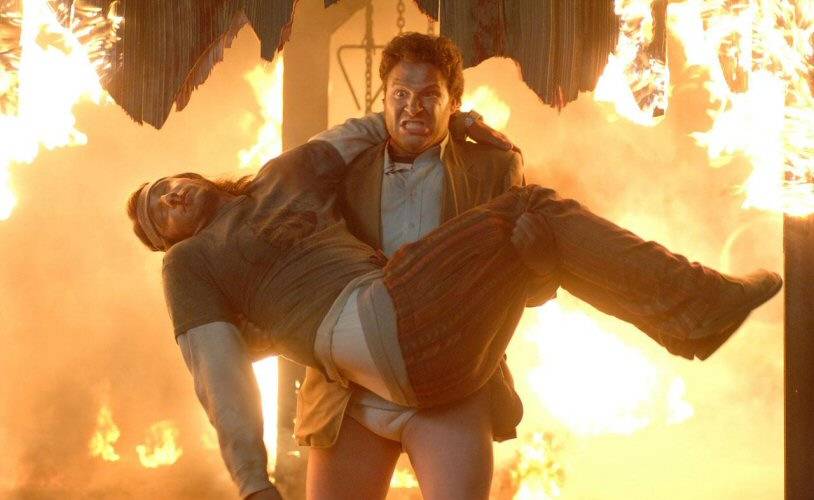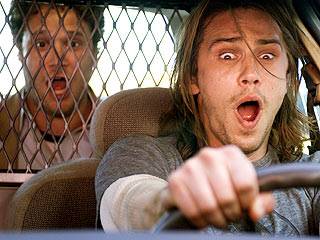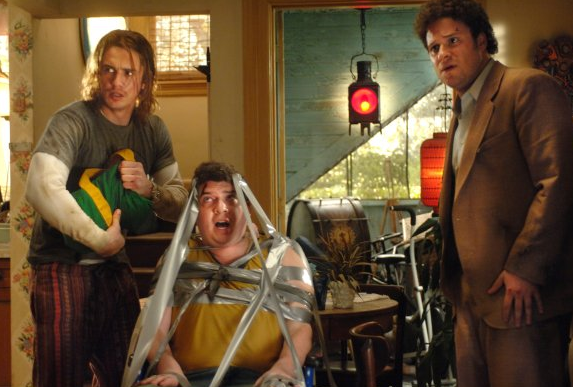
Pineapple Express is a movie that was sold to the public in a variety of ways, not all of them inaccurate. It was presented to us as an action movie, a buddy movie, a Seth Rogen vehicle, a James Franco vehicle, another raunchy flick from the Judd Apatow think tank, the ultimate stoner movie, etc. This schizophrenic approach makes sense when dealing with a movie as delightfully adverse to meeting expectations as Pineapple Express. But it works toward undercutting the film’s most interesting attribute: it’s a David Gordon Green movie.
Green, an Arkansas native who went to film school in North Carolina, is among the most eccentric of his contemporaries in modern cinema. He is often mentioned alongside filmmakers like Paul Thomas Anderson, Darren Aronofsky, Wes Anderson and others. But those are all generally more stylized filmmakers, making slicker products (except, of course, for Aronofsky, who recently took a left turn with The Wrestler.) Perhaps a better comparison for Green would be someone like Stephen Soderbergh, who clearly seeks out challenges and is willing to let his muse take him where it wants to go, even if it that happens to be in the service of a blockbuster Hollywood film.
Green’s first feature film, George Washington, was a pretty peculiar motion picture. It was kind of like a Little Rascals short written by William Faulkner and directed by Italian Neo-realist Vittorio Salvia. That’s a bit of an unnecessarily highbrow reference, but if you see the movie you’ll get what I’m talking about. It tells the story of a group of poverty-stricken children in the Deep South. Using a documentary-style, stripped-down aesthetic, Green highlighted the stark beauty of the vaguely gothic surroundings. The movie had a sweetness and innocence to it that helped keep it from becoming a depressing meditation on poverty and hopelessness. Instead, it was romantic and nostalgic, which was a zig instead of a zag that made people start to take notice of the filmmaker.
Green made three other films between George Washington and Pineapple Express: The tender love story All the Real Girls, the kinda horror-ish gothic fairy tale Undertow, and Snow Angels, as yet unseen by me. But it seems safe to say that very few people saw any of these films as stepping stones on the path to making a studio film, and a big-budget, pothead action comedy studio film at that.
 Pineapple Express is the story of Dale Denton, as played by Seth Rogen, who also co-wrote the screenplay with Evan Goldberg from a story written by Rogen, Goldberg and executive producer Judd Apatow. Dale is a lazy, unambitious, twenty-something who works as a process server. He doesn’t much care for his job, but he has two loves: his high school-aged girlfriend (Amber Heard) and the sweet cheeba. The latter is provided by the film’s other lead, and true revelation, Saul (James Franco). Franco is the most surprising actor in the movie, making us forget all the pretty-boy roles he’s taken over the years by creating a fully-formed character that remains likeable despite his general grunginess.
Pineapple Express is the story of Dale Denton, as played by Seth Rogen, who also co-wrote the screenplay with Evan Goldberg from a story written by Rogen, Goldberg and executive producer Judd Apatow. Dale is a lazy, unambitious, twenty-something who works as a process server. He doesn’t much care for his job, but he has two loves: his high school-aged girlfriend (Amber Heard) and the sweet cheeba. The latter is provided by the film’s other lead, and true revelation, Saul (James Franco). Franco is the most surprising actor in the movie, making us forget all the pretty-boy roles he’s taken over the years by creating a fully-formed character that remains likeable despite his general grunginess.
One night, while sitting in his car and getting ready to serve some papers, Dale looks up and sees something terrible through the window of a house across the street: a mob boss and a police woman (Gary Cole and Rosie Perez) shooting a man in the head. Panicked, Dale throws the roach he was smoking out the window and frantically drives away, hitting several cars while he’s at it (and drawing the attention of the bad guys). Not knowing where else to go, he rushes to Saul’s house, where they realize something: the weed Dale was smoking is the exotic strain known as Pineapple Express. Saul is the only dealer in town who has it, and Dale is the only person in town he sold it to. If the killers find the roach that Dale dropped out of his car, they can find him. So the boys run, the mobsters pursue, and hilarity ensues. The boys camp out in the woods, hitchhike back in town, throw a dustbuster at an informant, share an awkward dinner with Dale’s girlfriend’s parents (Ed Begley Jr. and Nora Dunn), kill several people each in a big shootout in an underground bunker, and enjoy a good breakfast.
 Mention must be made of Danny McBride, playing the double-crossing friend Red, who joins back with the guys at the end after being shot many times and still surviving. McBride, a college friend of Green who is now a regular in comedies such as Tropic Thunder, where he played the explosions expert, straight up steals the movie. Pretty much everything that comes out of his mind is comedy gold. A lot of the film was improvised, which speaks both to the actors’ background in improv and to the loose environment that Green creates on a set, so it’s impossible to say how much of the dialogue was in Rogen and Goldberg’s script and how much of it came from McBride. But his subtle, understated delivery of the most ridiculous lines elevates any scene he’s in. His non sequitors are hilarious: “You see this? There’s no hair under here. It makes me aerodynamic when I fight,” or, “You know, we just kind of dipped our toes into murder.”
Mention must be made of Danny McBride, playing the double-crossing friend Red, who joins back with the guys at the end after being shot many times and still surviving. McBride, a college friend of Green who is now a regular in comedies such as Tropic Thunder, where he played the explosions expert, straight up steals the movie. Pretty much everything that comes out of his mind is comedy gold. A lot of the film was improvised, which speaks both to the actors’ background in improv and to the loose environment that Green creates on a set, so it’s impossible to say how much of the dialogue was in Rogen and Goldberg’s script and how much of it came from McBride. But his subtle, understated delivery of the most ridiculous lines elevates any scene he’s in. His non sequitors are hilarious: “You see this? There’s no hair under here. It makes me aerodynamic when I fight,” or, “You know, we just kind of dipped our toes into murder.”
But even though improvisation is an important part of the process of the film, the script is surprisingly tight and well plotted, with many subtle jokes that might not be picked up on in the first viewing. A particular favorite bit of mine is how every paranoid delusion that Dale and Saul have turns out to be true. They become convinced that the mobsters will find the roach and the street and tie it back to them — and it happens. When they’re in the woods, they throw their phones away because they’re convinced that the cops will triangulate the signal and find them. Later, the cop says that she’s trying to do just that. Some critics, such as Jim Emerson, have suggested that details like this are hints from the writers that what we’re seeing might just be a giant head trip from Dale and Saul, two guys imagining themselves as stars of an action movie. I think Emerson makes some good points, but I don’t really see it like that. I think that the whole movie, in fact, exists in all of our heads. All movies do.
But that’s a little obtuse. My point is, I think that what Green and Rogen/Goldberg are doing with the movie is not dissimilar to what Tarantino does in every movie’s he’s ever made: they are setting their film not in the “real world” so to speak, but in the world of cinema. For Tarantino, it’s mainly the world of Blaxploitation, film noir and chop-socky cinema. Pineapple Express is more in the vein of eighties action comedies like Midnight Run. For god’s sake, they even got Huey Lewis to do the theme song. But another major influence from the realm of cinema, and this is more prevalent in Green’s directorial style than in the screenplay, is the cinema of the seventies. The seventies get lionized in a lot of Easy Rider/Raging Bull-esque pieces, and it’s easy to see why. It was a time of great experimentation in the studio system, where weird little movies could find their place. Sometimes it resulted in a great film like Taxi Driver. But often it resulted in movies that played at the double bill of some drive in. Green seems to be channeling the latter in Pineapple Express. In particular this influence sticks out in Green’s transitions. He uses a lot of odd wipes and other framing devices to get us from scene to scene. He also uses his zoom lenses a lot, which you don’t see too much anymore. Green does a lot of quick zooms in and out, which call attention to themselves in a nicely stylized way. These elements, coupled with a couple good funky music cues, immediately put us in the back of a second run theatre in about 1976.
But it’s the little touches of cinematic poetry that really elevates Pineapple Express above the genre trapping that many viewed it in. Tiny moments, like Dale and Saul sword fighting in the woods or Saul looking up from a swing set to see a chubby little girl staring at him through a chain link fence, are played in slow motion. It’s kind of beautiful, and not really connected to the larger plot as a whole. But they make the movie what it is: pure cinema.
That’s right, pure cinema. This is a movie that could not have been told in any other medium. It is a movie about other movies, and about their limitations and their silliness, but also about the beautiful moments that movies can supply. A bit of a stretch? Maybe. But it’s weird and it’s random, and as such I think it’s a fitting tribute to a movie as individual as Pineapple Express.








